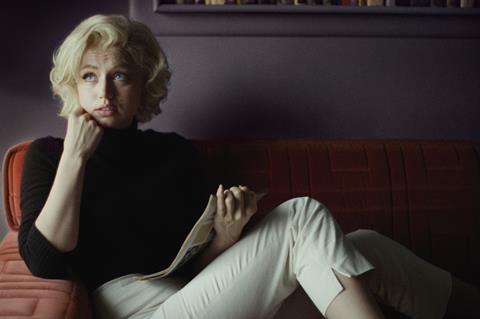Andrew Dominik’s adaptation of Joyce Carol Oates’ fictional novel paints a voyeuristic portrait of Marilyn Monroe

Dir. Andrew Dominik. US. 2022. 165mins
A difficult life leads to a difficult work in Andrew Dominik’s long-awaited Blonde. Joyce Carol Oates, on whose ‘fictional novel’ this is based, threw the scantest of fig leaves at the life of Marilyn Monroe and twisted her work around it, entwining invention with reality. Technically-skilled, well-acted and fatally over-long, it’s hard not to see Blonde as a chronicle of exploitation and abuse which merrily carries on the tradition – a sensation reinforced by Ana de Armas’s poignant performance as Marilyn. Blonde doesn’t quite dance on her grave, but Dominik, who adapted, does jump on it, covering everyone, audience included, in a grubby film of voyeurism.
A voyeuristic reinvention of a sad life blighted by mysogny, draped in technical know-how and an empathetic performance
Marilyn’s grave, in Westwood Village Memorial Park, now sits next to that of Hugh Hefner, another man who ruthlessly exploited Norma Jeane Baker in life, launching his Playboy empire on nude shots sold against her will. Dominik makes no apologies either, degrading his subject with face-on images of her fellating ‘The President’, face-on shots of her vomiting onto the lens/toilet, and a vagina-eye perspective of an abortion in a film that goes off the rails as much as Marilyn ever did, squandering everything the director and actor have carefully built up in its addled last act. Cries of surprise at its NC-17 rating for a 12-day theatrical window in the US (followed by a global release on Netflix from September 28) seem as bogus as the film’s claims to be a respectful treatment of an icon of our age. It’s a shame, and another shaming for Marilyn.
Netflix is a hive in the Marilyn Monroe cottage industry, and Blonde will sit well on the service, accompanied by a swill of publicity from a Venice Competition screening, mixed notices and the Twitter storm it is clearly courting. Outside that guaranteed audience, observers will question why the streaming service seems unwilling to edit the films from the arthouse auteurs it’s so eager to sign up: a potentially interesting film is lost in a gonzo 165 minutes (following on from other Venice offerings White Noise, at 136 minutes, and Bardo at 174 minutes). The transformation of Cuban-born De Armas will vault her into consciousness along with the film’s hair, make-up and costume team, who have to work to find texture amid Dominik’s seemingly random switches from black and white to colour. A score by the Australian director’s longtime collaborators Nick Cave and Warren Ellis is apt and sensitive (the director has shot documentaries One More Time With Feeling and This Much I Know To Be True with Cave, while the star of his Killing Them Softly, Brad Pitt, produces this through his Plan B).
Dominik’s film, shot in 2019, hones in on the duality of the abused and abandoned ‘orphan’ Norma Jean Baker and the sex symbol she created, Marilyn Monroe. The juxtaposition can be jarring. Captured first as a child, Norma Jeane has to contend with a deranged, violently abusive mother (Julianne Nicholson) in the fires of Los Angeles and the ashes of her home before being sent to an orphanage. Here, her obsession with her natural father, who abandoned them both, begins, although Oates/Dominik take this to cruel fictitious levels by the end.
She’s not seen again until Marilyn is created. The switch, or splintering, comes at the hands of a studio head Mr. Z (David Warshofsky) – a thinly disguised Darryl Zanuck – who rapes her for a role. Soon, she’s having a consensual threesome with Charlie Chaplin Jr and Edward G Robinson Jr and aborting a pregnancy for her role in Gentlemen Prefer Blondes. True or not, the pair betray her anyway. Her husband ‘The Ex Athlete’, Joe DiMaggio (Bobby Cannavale), beats her. Adrien Brody’s Arthur Miller (the Playwright) is kind, but by then Marilyn is a lost cause, a psychotic mess, as she’s further degraded by the corseted President (Caspar Phillipson).
The minutes tick by as Dominik recreates a mood, a place, and a time. De Armas is dropped into Some Like It Hot alongside Tony Curtis and Jack Lemmon, and onto magazine covers, and there’s a good deal of artistic flexing – a mood brought over from Mank, or The Aviator, and progressed to the ‘50s and ’60s. Paparazzi flash bulbs explode, mens’ faces distort, the camera hovers over crowd scenes before descending to track, while a foetus talks to Marilyn from the womb. She, meanwhile, is abused and confused – a solitary figure, given to calling her husbands ‘Daddy’. It’s a heady, sordid mix, a shit-show in life and on screen, which Dominik doesn’t know how to end until he finally, slowly kills her.
This isn’t the first Marilyn Monroe film by a long shot. It barely covers the bases of her life, and, like with Princess Diana, it’s unlikely to be the last. Calling it an adaptation of a ’fictional novel’, hailed by the author as if to give it some artistic legitimacy, is another fig leaf. For better, and for considerably worse, Blonde is a voyeuristic reinvention of a sad life blighted by misogyny, draped in technical know-how and an empathetic performance. Audiences have consumed Marilyn in life and in death: it’s unlikely the industry built up to exploit her will stop here. The hits keep on coming.
Production companies: Plan B,
Worldwide distribution: Netflix
Producers: Brad Pitt, Dede Gardner, Jeremy Kleiner, Tracey Landon, Scott Robertson
Screenplay: Andrew Dominik, from the ‘fictional novel’ by Joyce Carol Oates
Cinematography: Chayse Irvin
Production design: Florencia Martin
Editing: Adam Robinson
Music: Nick Cave and Warren Ellis
Main cast: Ana de Armas, Adrien Brody, Bobby Cannavale, Xavier Samuel, Julianne Nicholson, Lily Fisher, Evan Williams, Toby Huss, David Warshofsky, Caspar Phillipson, Dan Butler, Sara Paxton, Rebecca Wisocky






![The Brightest SunScreen[Courtesy HKIFF]](https://d1nslcd7m2225b.cloudfront.net/Pictures/274x183/3/5/0/1448350_thebrightestsunscreencourtesyhkiff_312678.jpg)















![The Brightest SunScreen[Courtesy HKIFF]](https://d1nslcd7m2225b.cloudfront.net/Pictures/100x67/3/5/0/1448350_thebrightestsunscreencourtesyhkiff_312678.jpg)

